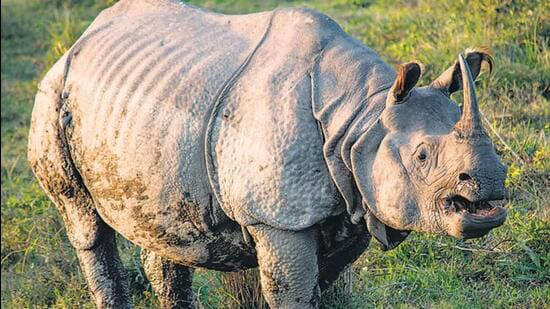In a recent development at the Kaziranga National Park, one of India’s premier wildlife sanctuaries, a rhino poacher met his demise in a dramatic gunfight with forest guards. The incident highlights the ongoing struggle to protect endangered species and preserve precious ecosystems, while also underscoring the dangers faced by those tasked with safeguarding wildlife from illegal activities.
Kaziranga National Park, situated in the northeastern state of Assam, is renowned for its rich biodiversity and is home to the world’s largest population of Indian one-horned rhinoceroses. However, the park has also been a frequent target for poachers seeking to profit from the illegal trade in rhino horns, which are highly sought after for their purported medicinal properties in certain traditional Asian medicines.
The recent gunfight between forest guards and a group of rhino poachers is a stark reminder of the persistent threats facing wildlife conservation efforts in the region. According to reports, forest guards received intelligence about the presence of poachers in the park and launched a search operation to apprehend them. In the ensuing confrontation, a fierce gunfight erupted between the poachers and the guards, resulting in the death of one poacher and the escape of others into the dense forests surrounding the park.
The incident underscores the dangers faced by forest guards and wildlife officials who put their lives on the line to protect vulnerable species from illegal exploitation. Armed poachers, often well-equipped and organized, pose a formidable challenge to law enforcement authorities, engaging in violent confrontations to evade capture and continue their illicit activities. The bravery and dedication displayed by the forest guards in confronting these threats are commendable, but the risks they face highlight the urgent need for enhanced support and resources to bolster wildlife protection efforts.
Moreover, the killing of a rhino poacher in the gunfight serves as a sobering reminder of the human cost associated with wildlife crime. While poaching is often viewed solely through the lens of its impact on endangered species, it is essential to recognize the broader societal implications of this illicit trade. Poachers, driven by economic desperation or greed, risk their lives and perpetuate violence in their pursuit of profit, contributing to instability and insecurity in the communities where they operate.
In addition to the immediate threat posed by poachers, the illegal trade in rhino horns has far-reaching consequences for biodiversity conservation and ecosystem integrity. Rhinos play a crucial role in maintaining the ecological balance of their habitats, and their disappearance could have cascading effects on other species and ecosystems. Furthermore, the loss of rhinos to poaching undermines ecotourism revenue and community livelihoods, depriving local communities of valuable resources and opportunities for sustainable development.
The incident at Kaziranga National Park underscores the importance of collaborative efforts involving government agencies, law enforcement authorities, conservation organizations, and local communities to combat wildlife crime effectively. Strategies to address poaching must encompass a range of approaches, including improved intelligence gathering, strengthened law enforcement, enhanced community engagement, and increased public awareness and education about the consequences of wildlife trafficking.
Furthermore, addressing the root causes of poaching, such as poverty, lack of alternative livelihood options, and demand for wildlife products, is crucial to achieving long-term success in wildlife conservation efforts. By addressing these underlying drivers, governments and conservation organizations can empower local communities to become stewards of their natural resources and partners in wildlife protection initiatives.
In addition, the gunfight between forest guards and rhino poachers at Kaziranga National Park highlights the ongoing challenges facing wildlife conservation efforts in Assam and beyond. While the death of a poacher is a tragic reminder of the human toll of wildlife crime, it also underscores the bravery and dedication of those working tirelessly to protect endangered species and preserve precious ecosystems. Moving forward, concerted efforts are needed to strengthen wildlife protection measures, address the root causes of poaching, and foster greater collaboration among stakeholders to ensure the survival of iconic species like the Indian one-horned rhinoceros.

